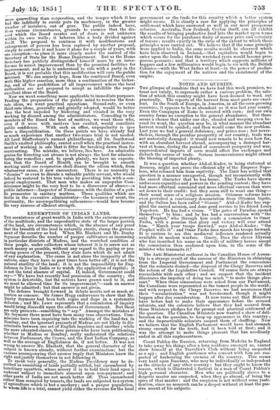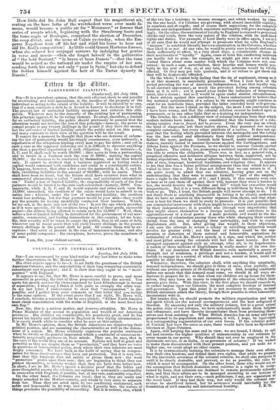NOTES AND QUERIES.
THE glimpse of sunshine that we have had this week promises, we , trust not vainly, to supersede rather a curious problem, the solu- tion of which this country might have been doomed to work out practically. The reports of the harvest from most parts are excel- lent. In the South of Europe, in America, in all the corn-growing countries, it appears to be as abundant as it was last year scanty. Even the Campagna of Rome is covered with corn; and our own country forms no exception to the general abundance. But there seems a chance that under our sky, clouded and weeping even be- yond its wont, the question may be, in what manner the abundant harvest would be spoiled; and then would come the new problem. Last year we had a general deficiency, and prices rose; but never- theless, through the peculiar prosperity of our country, trade was not materially damaged: it would now remain to be seen how far, with an abundant harvest abroad, accompanying a damaged har- vest at home, during the period of concurrent prosperity and war, unprecedented imports of corn would affect the exchanges and disturb the course of trade. Serious inconveniences might attend the blessing of imported plenty.
It was a question whether Abd-el-Kader, in being stationed at Broussa, might not prove the efficient ally of the Emperor Napo- leon, who released him from captivity. The Emir has settled that question in a manner unexpected, though not inconsistently with the sacred character that he has borne. The Turks have shown unforeseen capacities and powers in the pending contest; they have had more effectual command and more effectual cannon than were set down to their credit : but they seem still to want one thing— their usual sense of a religious mission. Ottoman reforms have even provoked a reactionary denunciation from Ottoman bigots, and the Sultan has been called " Giaour." Abd-el-Kader has sup- plied the sacred mission, and done good service to his friend Louis Napoleon. He has had a vision. "The gates of Paradise opened themselves" to him; and he has had a conversation with "the only Prophet," who through him sends a commission to Omar Pasha, with a promise that glory and victory will ever attend him. "March your troops forward," says A.bd-el-Kader; "the Prophet wills it": and Omar Pasha does march his troops forward. It is curious to see this mediteval influence rendered actually available in modern warfare. Query, Does the clever Illyrian who has inscribed his name on the rolls of military heroes accept the commission thus conferred upon him, in the sense of the minister who transmits it?
The Anti-Ministerial outburst in the Canadian House of Assem- bly is a strange result of the success of the Ministers in obtaining from the Imperial Government and Parliament the concessions that the colonists desired—the disposal of the Clergy Reserves and the reform of the Legislative Council. Of course facts are always reconcilable with each other ; and we suspect that the incident illustrates the impolicy of doing too much "to make things plea- sant." When these concessions were asked from our Parliament, the Canadians were represented as the tamest people in the world; and with respect to the Clergy Reserves we had assurances that their "secularization" was not foredoomed, though it might happen after due consideration. It now turns out that Ministers have before had to make their appearance before the aroused colonists, and the colonists believe that they had secured from those Ministers pledges for the prompt and practical settlement of the question. The Canadian Ministers now wanted a show of deli- beration on the question, to keep up appearance in this country ; and the impracticable colonists suspect them of shuffling. Now we believe that the English Parliament would have had stomach strong enough for the truth, had it been told at first; and it was the attempt to make things pleasant that has needlessly ended in all this unpleasantness.
Count Pahlen the Russian, returning from Madeira to England to take away his things after a long residence amongst us, cannot show himself at the Traveller's Club without being suspected as a spy ; and English gentlemen who consort with him are sus- pected of harbouring the enemies of the country. This seems very hard upon Russians, who may be individually as independent as the citizens of any other country : but they ought to know the reason, which is illustrated it fortiori in a man of Count Pahlen's high personal character. Men who are politically slaves to a despotic master are suspected, when they go abroad, of being the spies of that master : and the suspicion is not without some justi- fication, since no monarch can be a despot without at least the pas- sive assent of his subjects. How little did Dr. John Bull expect that his magnificent air, resting on the bare laths of the wretehedest verse ever made fa- mous, would become a public air for " Mounseer," or foresee that series of events which, beginning with the Strasbourg boots and the tame eagle of Boulogne, comprised the election of December, the coup d'etat, and the scene at Calais yesterday, when the Em- peror Napoleon took off his hat and staid his horse to hear out old Dr. Bull's composition ! As little could Queen Hortense foresee, when she solaced her conjugal sorrows by indulging her genius in verse and musio--when she forgot herself in the gallantries of" the bold Bastard," "le brave et beau Dunois "—that the tune would be seized as the national air under the empire of her son, sending forth his army not only "pour la Sync," but eke to defend the Bolden himself against the heir of the Tartar dynasty in Russia!



























 Previous page
Previous page